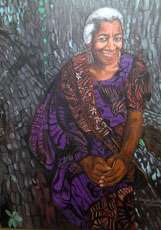|
Gullah Language
|
|
 |
"All duh people wut come from africa aw oberseas wuz call Golla and dey talk wut call Golla talk." - Georgia,1936
Until quite recently, it was commonly believed that those who spoke Gullah were speaking what many termed broken English. Few realized that this language is living evidence of a remarkable transformation that took place from Africa to African American culture. People speaking Gullah is a testimony to one of the great acts of human endurance in the history of the world, the survival of African people away from home. In the early times, slave holders and their visitors on the rice plantations often commented on the presence of the distinct language among the slave population. They had no idea that they were witnesses to a cultural phenomenon. Right before their eyes were the transformation, adaptation and persistence of a culture. During the times, our people came from different language and culture groups, and geographical regions. They were brought here to be the main labor force in the rice and cotton industries, responsible for the planting, hoeing, ditching, pounding, plowing, basket making, winnowing, picking, and threshing. It goes without saying that communication was necessary for survival and execution. The language that we developed was born on African soil as a pidgin, an auxiliary language. As in case with pidgins, it was developed for communication purposes, spoken among various African groups in business transactions and intertribal affairs. By the height of the slave trade, pidgins were firmly placed among African groups. When different Africans were captured and housed together in West Coast holding cells, the pidgins spoken in freedom, became their method of communication in captivity. As time went on, the main auxiliary language combined the most prominent pidgins, other linguistics features and speech patterns common among them with the English words and vocabulary spoken to and about them by the master class. This creolization set the stage, on African soil, for what is now still spoken and called Gullah. It was sustained because of the large numbers of Africans on rice and Sea Island cotton plantations, the isolation that characterized the regions along the coast and the continued influx of pure Africans smuggled into these isolated areas after the slave trade was prohibited. The lanuage as it exists today still contains African words and language features that can be traced to African groups today. The absence of the verb to be, final t's , and the use of only two pronouns 'e ( he, she it) and onna (you, us, them) bears witness to the fact that what ever its history, the Gullah language has its own flavor, rules and regulations. Excerpt from The Ultimate Gullah Cookbook by Jesse Edward Gantt, Jr. and Veronica D.Gerald |
|
|
